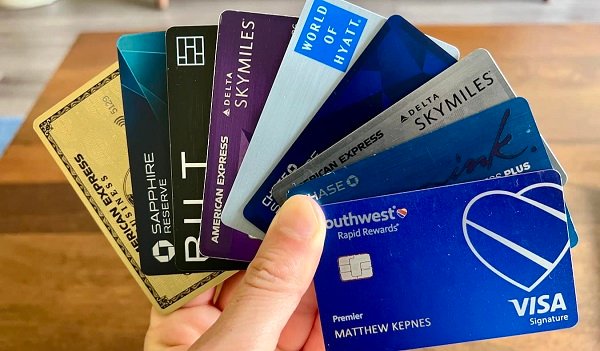In today’s competitive financial landscape, rewards credit cards have become increasingly popular among consumers. They offer various incentives, such as cashback, travel points, and discounts, for making purchases with the card. While these rewards can be appealing, choosing the best rewards credit card for your needs requires careful consideration. With numerous options available, it can be overwhelming to determine which one provides the most value. In this article, we will explore what makes a rewards credit card the best for you, key factors to consider when selecting one, and how to maximize your benefits.
Key Takeaways
- The best rewards credit card for you depends on your spending habits and preferences.
- Evaluate reward rates, annual fees, sign-up bonuses, and redemption options before choosing a card.
- Maximize your rewards by consolidating spending, taking advantage of bonus categories, and paying your bill in full.
- Always review the terms and conditions to ensure the card aligns with your financial goals.
Understanding Rewards Credit Cards
Before diving into what makes a rewards credit card the best, it’s important to understand how they work. A rewards credit card is a type of credit card that offers perks or rewards based on your spending. These rewards typically come in the form of points, miles, or cashback. The idea is simple: the more you use the card for purchases, the more rewards you accumulate. Over time, you can redeem these rewards for travel, merchandise, gift cards, or even statement credits.
There are three main types of rewards credit cards:
- Cashback Cards: These cards offer a percentage of cashback for every purchase you make. Cashback can typically be redeemed as a statement credit, check, or deposited directly into your bank account.
- Travel Rewards Cards: These cards allow you to earn miles or points that can be redeemed for travel-related expenses such as flights, hotel stays, car rentals, and more.
- Points-based Cards: These cards offer points for purchases, and the points can be redeemed for a variety of rewards, including travel, merchandise, or gift cards. Some point-based cards allow you to transfer points to travel partners for enhanced flexibility.
Factors to Consider When Choosing the Best Rewards Credit Card

To determine which rewards credit card is the best for you, it’s essential to evaluate several key factors. Your personal financial situation, spending habits, and preferences will influence your decision. Below are some of the most important elements to consider.
1. Reward Rate and Categories
One of the most critical factors in choosing a rewards credit card is the reward rate. This refers to how much you earn for every dollar spent. Most cards offer different rates for various categories, such as dining, groceries, gas, and travel. Some cards may provide higher rewards for specific categories, so it’s important to match the card’s reward structure with your spending habits.
For example, if you frequently dine out, a card that offers higher cashback or points for dining expenses may be a great fit. Similarly, if you travel often, a travel rewards card offering more miles for travel-related purchases would be beneficial.
2. Annual Fees
Many rewards credit cards charge an annual fee. While some cards come with no annual fee, others may charge anywhere from $50 to $500 or more. It’s important to weigh the cost of the annual fee against the rewards you’ll earn. In some cases, a card with a higher annual fee may offer more valuable perks or higher reward rates, making it worthwhile. However, if you don’t spend enough to justify the fee, it may be better to opt for a no-annual-fee card.
3. Sign-Up Bonus
Many rewards credit cards offer sign-up bonuses as an incentive for new cardholders. These bonuses can be substantial, ranging from $100 to several hundred dollars worth of rewards. To earn the bonus, you typically need to meet a minimum spending requirement within the first few months of opening the account. A sign-up bonus can significantly boost your rewards, especially if you have planned purchases coming up.
4. Redemption Options
Different rewards cards offer varying redemption options. Some may limit your redemption choices to specific partners or categories, while others offer greater flexibility. When evaluating a card, consider whether the redemption options align with your goals. For example, if you’re interested in using your rewards for travel, make sure the card offers partnerships with airlines and hotels that fit your needs.
In addition, look into whether the rewards expire. Some cards have expiration dates for rewards points or miles, while others do not. If you plan to accumulate rewards over time, choose a card with no expiration policy to avoid losing your hard-earned rewards.
5. Interest Rates and Fees
Although rewards credit cards are designed to benefit you, they can also come with high interest rates if you carry a balance. It’s important to consider the annual percentage rate (APR) of the card, especially if you anticipate carrying a balance from month to month. If you don’t plan on paying your balance in full each month, a lower APR card may be a better option.
Additionally, check for other fees such as foreign transaction fees, late payment fees, and cash advance fees. These charges can quickly erode the value of the rewards you earn.
6. Additional Benefits and Perks
In addition to earning rewards, many rewards credit cards offer extra benefits and perks. These can include travel insurance, purchase protection, extended warranties, access to exclusive events, and more. Consider which additional benefits are most valuable to you when selecting a card.
For example, if you travel frequently, look for a card that offers perks like free checked bags, airport lounge access, or travel insurance. These benefits can enhance your overall experience and provide more value than just the rewards.
7. Credit Score Requirements
Before applying for a rewards credit card, check whether your credit score qualifies you for the card. Most rewards credit cards require a good to excellent credit score (typically above 670) to be approved. If your credit score is lower, you may want to explore other options or work on improving your credit score before applying.
Maximizing Your Rewards

Once you’ve selected the best rewards credit card for your needs, it’s essential to use the card strategically to maximize your rewards. Here are a few tips to get the most out of your rewards credit card:
- Consolidate Your Spending: Use your rewards credit card for as many purchases as possible to accumulate points, miles, or cashback. However, be mindful of overspending or carrying a balance, as interest charges can negate your rewards.
- Take Advantage of Bonus Categories: Many cards offer rotating or fixed bonus categories where you can earn higher rewards. Be sure to activate these bonus categories if required, and use your card for purchases in those categories.
- Monitor Sign-Up Bonus Requirements: Keep track of the spending requirements for earning a sign-up bonus. Plan your purchases accordingly so that you meet the threshold within the allotted time frame.
- Redeem at Optimal Value: Some rewards programs offer better value when redeeming through specific partners or for particular rewards. For example, you may get more value by transferring points to a frequent flyer program rather than redeeming them for merchandise.
- Pay Your Bill in Full: To avoid interest charges, always aim to pay your balance in full each month. This ensures that the rewards you earn aren’t offset by high-interest payments.
Understanding the Basics of Rewards Credit Cards
A rewards credit card is a type of credit card that offers incentives for each dollar you spend. The rewards come in various forms—cashback, travel points, or rewards points—that can be redeemed for a variety of items such as flights, hotel stays, merchandise, and even statement credits.
The concept behind these cards is simple: the more you spend, the more rewards you earn. Rewards credit cards come in different types, including:
- Cashback Cards: Provide a percentage of cashback for each purchase made. For example, you may earn 1% cashback on all purchases or higher rates for specific categories like groceries or dining.
- Travel Rewards Cards: These cards accumulate points or miles that can be redeemed for travel-related expenses like flights, car rentals, and hotel stays. Travel rewards cards typically offer partnerships with airlines and hotel chains, enhancing their value for frequent travelers.
- Points-based Cards: Earn points that can be used for a variety of rewards, including travel, merchandise, or gift cards. Some points-based cards also allow you to transfer points to airline or hotel partners, providing greater flexibility.
While the appeal of rewards cards is obvious, finding the one that aligns with your lifestyle requires thoughtful analysis. Let’s dive into the key factors that make a rewards credit card the best fit for you.
Key Factors to Consider When Choosing a Rewards Credit Card
1. Rewards Structure and Categories
The rewards structure is perhaps the most important factor to consider. Different cards offer different rewards for various categories. For instance, some cards may offer 2% cashback on dining, 3% on groceries, and 1% on all other purchases. Others may have rotating categories, where you earn higher rewards on specific categories each quarter (e.g., gas, travel, restaurants).
Choosing the best rewards card depends on your spending habits. If you eat out frequently, a card that offers enhanced rewards for dining out might suit you. Similarly, if you’re a frequent traveler, you’ll want a card that gives higher rewards for travel-related purchases. Review the rewards categories to ensure they match your most common expenses.
2. Annual Fees and Costs
While some rewards credit cards offer no annual fee, many charge an annual fee, which can range from $50 to over $500. The annual fee can sometimes be offset by the value of rewards and benefits offered by the card, but it’s important to determine whether the card’s features justify the fee.
For example, cards with higher annual fees may offer superior benefits, such as travel insurance, airport lounge access, or higher rewards rates. However, if you don’t travel frequently or don’t spend enough to justify the fee, it might make sense to choose a card with a lower or no annual fee.
3. Welcome Bonuses
A welcome bonus (or sign-up bonus) is one of the most attractive features of rewards cards. These bonuses typically require you to meet a minimum spending threshold within a specified time frame (usually 3 months) after opening the account. For example, you may earn a bonus of 50,000 points after spending $3,000 in the first 3 months.
The value of the sign-up bonus can vary depending on the card, but it can significantly enhance your rewards, especially for big spenders. It’s important to factor in the bonus as part of your decision-making process, as it can provide extra value upfront.
4. Redemption Options
The flexibility of redeeming your rewards is another crucial aspect of choosing the right rewards card. Some cards allow you to redeem rewards for a broad range of options, including travel, merchandise, statement credits, or even charitable donations. Others may restrict how and when you can use your rewards.
When evaluating redemption options, consider whether you want to redeem your rewards for travel, which card partners with airlines and hotels, or if you prefer cashback for more immediate financial relief. Furthermore, check the expiration policies—some rewards expire after a certain period, while others never expire.
5. Interest Rates and Fees

While rewards cards are designed to offer benefits, they can become costly if you don’t pay your balance in full each month. Credit cards often carry high interest rates, and carrying a balance can negate any rewards you’ve earned.
Before applying for a rewards card, review the APR (annual percentage rate) and fees associated with the card. Look out for things like late payment fees, foreign transaction fees, and balance transfer fees. If you tend to carry a balance, it might be better to opt for a card with a lower interest rate rather than focusing solely on rewards.
6. Additional Perks and Benefits
Many rewards cards offer additional perks that go beyond the basic rewards structure. These benefits can include:
- Travel Insurance: Coverage for trip cancellations, delays, lost luggage, and rental car damage.
- Purchase Protection: Insurance for damaged or stolen items purchased with the card.
- Airport Lounge Access: Exclusive access to airport lounges for cardholders and their guests.
- Concierge Services: Assistance with booking travel, making reservations, or finding special offers.
These extra perks can add significant value, particularly if you travel often or make expensive purchases. Make sure to factor in the overall value of these perks when comparing different rewards cards.
7. Credit Score Requirements
Rewards credit cards generally require a good to excellent credit score for approval. If your credit score is below 670, you may have difficulty qualifying for the best rewards cards. However, some cards are designed for people with average or fair credit and may offer lower rewards rates or fewer benefits.
Before applying for a rewards card, check your credit score to ensure you’re applying for a card you’re likely to be approved for. If necessary, work on improving your credit score before applying to increase your chances of qualifying for cards with more attractive rewards.
Maximizing Your Rewards
To truly benefit from your rewards credit card, it’s essential to use it strategically. Here are a few ways to maximize your rewards:
- Use Your Card for Everyday Purchases: Consolidate your spending on your rewards card to accumulate points, miles, or cashback. This includes everyday purchases like groceries, gas, and bills.
- Take Advantage of Bonus Categories: Some cards offer rotating or fixed bonus categories with higher rewards. Be sure to activate these categories and use your card for eligible purchases.
- Meet the Sign-Up Bonus Requirements: Plan your spending to meet the minimum spending requirement for the welcome bonus. This can significantly boost your rewards balance early on.
- Pay Your Balance in Full: To avoid interest charges, always pay off your balance in full each month. Carrying a balance can negate the value of the rewards you earn.
- Consider Transferring Points: Many rewards cards allow you to transfer points to travel partners for better redemption options. Look for Opportunity to transfer points to airlines or hotels to maximize their value.
Read More :-What Are The Best Travel Rewards Credit Cards For 2025?
Conclusion
Choosing the best rewards credit card for you requires evaluating your spending habits, goals, and the rewards that will provide the most value. Whether you’re interested in cashback, travel rewards, or points, there’s a card that fits your lifestyle. By considering factors such as reward rates, fees, and redemption options, you can make an informed decision that maximizes your benefits. Don’t forget to pay attention to additional perks and the overall value you receive from your card to ensure you’re getting the best return on your spending.
FAQs
What is the best rewards credit card?
The best rewards credit card depends on your spending habits. If you travel frequently, a travel rewards card may be ideal. If you want simplicity, a cashback card may be better. Compare reward rates, fees, and benefits to find the best fit for you.
How do I earn rewards on a credit card?
Rewards are earned based on the purchases you make with your credit card. Each card offers a specific reward rate (e.g., 1 point per dollar spent, 2% cashback) for various categories like groceries, dining, or travel.
Can I redeem my rewards for cash?
Many rewards credit cards offer cashback as a redemption option, allowing you to apply the rewards as statement credits, deposit them into your bank account, or receive them as checks.
How do sign-up bonuses work?
Sign-up bonuses are rewards offered to new cardholders who meet a minimum spending requirement within a certain period (typically 3 months). The bonus is typically awarded once the spending requirement is met.
Are there any fees associated with rewards credit cards?
Some rewards cards charge annual fees, foreign transaction fees, or late payment fees. It’s essential to review the fee structure of any card before applying to ensure it aligns with your needs.
Can I transfer my rewards to other programs?
Some rewards cards allow you to transfer points or miles to partner airlines, hotels, or other programs. This can often provide greater value, particularly for travel rewards.
Do rewards credit cards have an expiration date?
Some rewards programs impose expiration dates on points, miles, or cashback if not used within a certain period. Be sure to check the terms and conditions of your card’s rewards program to understand any expiration policies.




